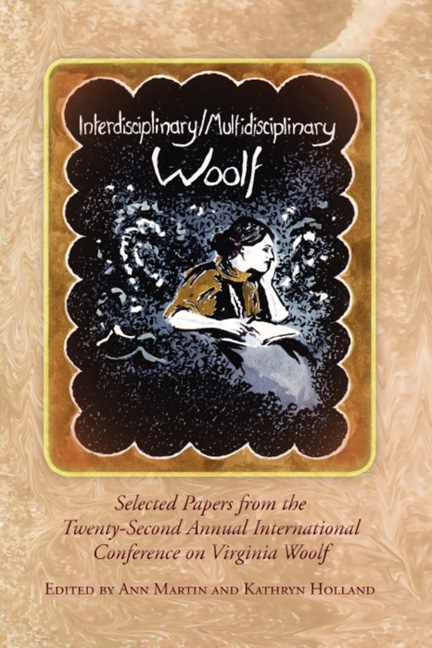Book contents
- Frontmatter
- Contents
- Introduction to Interdisciplinary/Multidisciplinary Woolf
- Acknowledgments
- List of Abbreviations
- History, Materiality, Multiplicity
- Multidisciplinary Woolf / Multiple Woolfs?
- Woolf, History, Us
- “Full of Experiments and Reforms”: Virginia Woolf, John Maynard Keynes, and the Impossibility of Economic Modeling
- Desiring Statues and Ambiguous Sexualities in Jacob's Room
- Challenging the Family Script: Woolf, the Stephen Family, and Victorian Evangelical Theology
- History as Scaffolding: Woolf's Use of The Times in The Years
- Vincent van Gogh, Virginia Woolf, and Old Shoes: A Cross-Cultural Iconography of Historical Truama from the Great War to the Iraq War
- Stopped at the Border: Virginia Woolf and the Criminalization of Dissent in Democratic Societies
- “Q. And babies? A. And babies”: On Pacifism, Visual Truama, and the Body Heap
- Photography, History, and Memoir of the Spanish Civil War: Interdisciplinary Views
- Patterns, Practices, Principles
- Art, Influence, Embodiment
- Publishing, Politics, Publics
- Notes on Contributors
- Conference Program
Multidisciplinary Woolf / Multiple Woolfs?
from History, Materiality, Multiplicity
- Frontmatter
- Contents
- Introduction to Interdisciplinary/Multidisciplinary Woolf
- Acknowledgments
- List of Abbreviations
- History, Materiality, Multiplicity
- Multidisciplinary Woolf / Multiple Woolfs?
- Woolf, History, Us
- “Full of Experiments and Reforms”: Virginia Woolf, John Maynard Keynes, and the Impossibility of Economic Modeling
- Desiring Statues and Ambiguous Sexualities in Jacob's Room
- Challenging the Family Script: Woolf, the Stephen Family, and Victorian Evangelical Theology
- History as Scaffolding: Woolf's Use of The Times in The Years
- Vincent van Gogh, Virginia Woolf, and Old Shoes: A Cross-Cultural Iconography of Historical Truama from the Great War to the Iraq War
- Stopped at the Border: Virginia Woolf and the Criminalization of Dissent in Democratic Societies
- “Q. And babies? A. And babies”: On Pacifism, Visual Truama, and the Body Heap
- Photography, History, and Memoir of the Spanish Civil War: Interdisciplinary Views
- Patterns, Practices, Principles
- Art, Influence, Embodiment
- Publishing, Politics, Publics
- Notes on Contributors
- Conference Program
Summary
The title of the conference is the theme of my paper. I will sketch out some of the problematics of multidisciplinarity, focusing on visual studies, in relation to Woolf; touch on critics including Giorgio Agamben and Jacques Rancière, who offer helpful prisms; and reflect on the relevance of multidisciplinarity to notions of authorship and signature in Woolf.
I start with, and return later to, this collage. When researching Snapshots of Bloomsbury I discovered the page in one of the boxes of loose photographs in Woolf's archive in the Harvard Theatre Collection, the Houghton Library. The image had no accompanying details of author, date or location. I was intrigued by Woolf's possible expertise in collage, as I follow Max Ernst's view in his Cahiers d'art that collage can produce “a sudden intensification of the visionary faculties.” So I researched in other archives seeking further examples of Woolf's collage techniques but without success. My response to this single collage, when reproducing the page in Snapshots of Bloomsbury, was to link the material directly to Woolf's publications. In a fairly obvious annotation, I noted the names of the figures in the image (Mussolini, Christ, Prof. J. M. Murray, Abraham Lincoln, Emperor Wilhelm, Count Berchtold, Frederick Delius); that the page might be a preparation for Three Guineas using, as it does, similar images as those in Woolf's scrapbooks; and that the image reflected Woolf's original title for Three Guineas, ‘Men Are Like That’, a phrase from Stella Duckworth. What I did, of course, consciously or unconsciously, was to exclude multidisciplinarity. I will return to the image in a moment, but first I wish to think through the ways in which visual materials challenge such an obvious determination.
What makes studies of Woolf's encounters with the visual so interesting and productive is that such encounters call for multidisciplinarity. For example, photography escapes narrative. Photography sees without hierarchy. The smallest details become insistent signs. Photography has a capacity for unpredictable significance. The value of the documentation cannot be known in advance.
- Type
- Chapter
- Information
- Interdisciplinary/Multidisciplinary Woolf , pp. 2 - 12Publisher: Liverpool University PressPrint publication year: 2013



